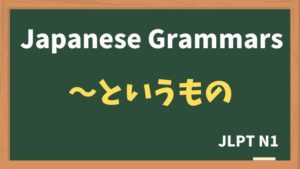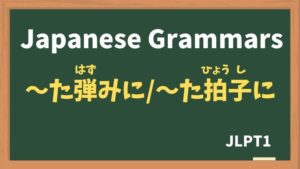
Explanation:〜ゆえに
fa-check-circleMeaning
"〜ために / 〜から”
原因や理由を表します。
Used to indicate a reason or cause, similar to "because" or "due to" in English. It is a formal and somewhat literary phrase, often found in written language, speeches, and formal contexts. This expression emphasizes the causal relationship between two events or situations, where the first clause (before "ゆえに") explains the reason for the outcome or situation described in the second clause.
fa-check-circleForm
V(plain form)+ ゆえ(に)
イA(plain form)+ ゆえ(に)
ナAな / である / だった + ゆえ(に)
Nの / である / だった + ゆえ(に)
fa-check-circlePoints
- Reason/Cause: "〜ゆえに" expresses the cause or reason for something, making it clear that the first action or situation leads to the second.
- Formal and Literary: This expression is considered formal and is often used in writing, such as in academic papers, legal documents, or formal speeches.
- Old-Fashioned Tone: While still in use, "〜ゆえに" has an old-fashioned or classical tone and is more commonly replaced by "〜だから" or "〜ので" in casual conversation.
fa-check-circleJLPT Level
N1
Sample sentenes
期待しているがゆえに、彼には厳しいことをいうこともある。
Because I have high expectations, I sometimes say harsh things to him.
子供がしたことゆえに、どうか許してもらえないでしょうか。
Since it was done by a child, could you please forgive them?
政府の対応が遅れたゆえに、被害が広がったといっても過言ではない。
It’s not an exaggeration to say that the damage spread due to the government's delayed response.
開発途上国では貧しさのゆえに、子供でも働かなければ生きていけない国もある。
In some developing countries, poverty forces even children to work in order to survive.
経験不足であったゆえに、この仕事をうまくこなせなかった
Due to a lack of experience, I couldn’t handle this job well.
Vocabulary
| Japanese |
English | |
| 開発途上国 | かいはつとじょうこく | developing countries / third world countries |






